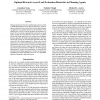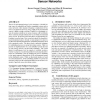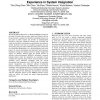553 search results - page 82 / 111 » A General Theory of Additive State Space Abstractions |
AAAI
2011
13 years 11 months ago
2011
Planning agents often lack the computational resources needed to build full planning trees for their environments. Agent designers commonly overcome this finite-horizon approxima...
134
click to vote
SIGMETRICS
2004
ACM
15 years 5 months ago
2004
ACM
The use of environmental energy is now emerging as a feasible energy source for embedded and wireless computing systems such as sensor networks where manual recharging or replacem...
COMPUTER
2002
14 years 11 months ago
2002
wever, by using a simple model of abstract building blocks: quantum bits, gates, and algorithms, and the available implementation technologies--in all their imperfections.7 The bas...
IPTPS
2004
Springer
15 years 5 months ago
2004
Springer
Structured peer-to-peer (p2p) overlay networks provide a decentralized, self-organizing substrate for distributed applicad support powerful abstractions such as distributed hash t...
DGO
2008
15 years 1 months ago
2008
The Florida Public Hurricane Loss Model (FPHLM) developed in the State of Florida offers an open, public and effective tool for the government to regulate the insurance ratemaking...



